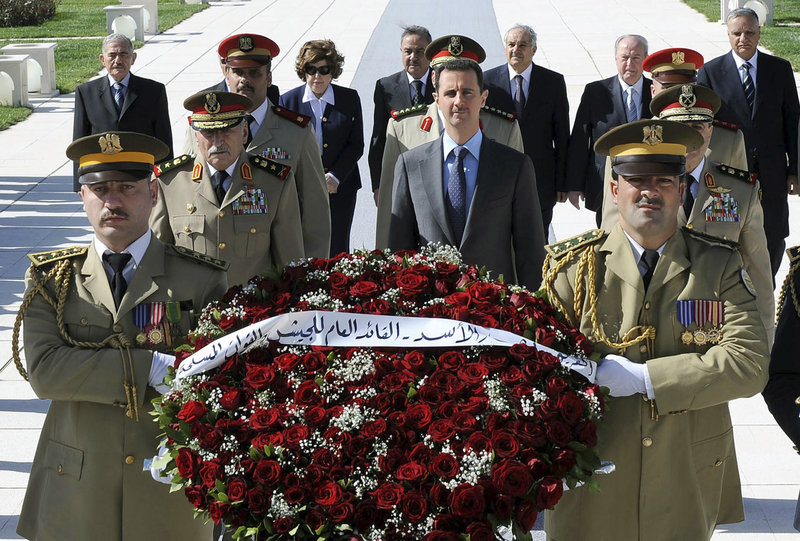BEIRUT – Syrian security forces opened fire Friday on thousands of protesters demanding regime change, killing more than 30 people in a sign that President Bashar Assad is prepared to ride out a wave of rapidly escalating international outrage.
The U.N. said it is sending a team into Syria to investigate and the European Union is expected to place sanctions on Syrian officials next week — both significant blows to Assad, a British-educated, self-styled reformer who has tried to bring Syria back into the global mainstream over his 11 years in power.
In Washington, State Department spokesman Mark Toner said the United States was pressing the Syrian government to cease “violence against innocent citizens who are simply demonstrating and trying to state their aspirations for a more democratic future.”
Friday’s protests spanned the nation of 23 million, from the capital to the Mediterranean coast and the arid northeast. The bloodshed was the latest spasm in what has become a weekly cycle of mass protests followed by a swift and deadly crackdown.
But pressure was mounting on Assad, who insists the unrest is a foreign conspiracy carried out by “terrorist groups.” More than 580 civilians and 100 soldiers have been killed since the revolt began, rights groups say.
“What it looks like here is a systematic attack on a civilian population, a political decision to shoot to kill unarmed demonstrators and that could very well be a crime against humanity,” Human Rights Watch counsel Reed Brody told AP Television News.
Assad, who inherited power from his father in 2000, is determined to crush the revolt that has now become the gravest challenge to his family’s 40-year dynasty.
He has tried a combination of brute force, intimidation and promises of reform to crush the unrest, but his attempts have failed so far.
Still, Syria is a highly unpredictable country, in part because of its sizable minority population, the loyalty of the military and the regime’s web of allegiances to powerful forces including Lebanon’s Hezbollah and Shiite powerhouse Iran.
Serious and prolonged unrest are likely to hurt the regime’s proxy in Lebanon — Hezbollah — and weaken Iran’s influence in the Arab world.
Even as protests were raging on Friday, Syria’s prime minister announced the formation of a committee to study ways to combat corruption. In the past, the overtures would have been seen as significant concessions. But protesters were largely unmoved, inspired by the uprisings sweeping the Arab world and enraged at the mounting death toll in Syria.
Now the protesters are seeking the downfall of the regime.
Thousands of protesters took to the streets Friday despite a security chokehold on the most volatile areas along with a stepped-up intimidation campaign.
“The regime has resorted to scare tactics used by Assad’s father in the 1980s,” said Radwan Ziadeh, a visiting scholar at the Institute for Middle East Studies at George Washington University.
Assad’s father, Hafez Assad, kept Syria under rigid control for three decades. His most notorious act was crushing a Sunni uprising in 1982 by shelling the town of Hama, killing 10,000 to 25,000 people, according to Amnesty International estimates. Conflicting figures exist and the Syrian government has made no official estimate.
Bashar Assad has not done anything on the scale of the Hama massacre in his 11 years in power, but his tactics include a policy of “collective punishment” by arresting entire families to pressure their relatives into turning themselves in.
Send questions/comments to the editors.



Success. Please wait for the page to reload. If the page does not reload within 5 seconds, please refresh the page.
Enter your email and password to access comments.
Hi, to comment on stories you must . This profile is in addition to your subscription and website login.
Already have a commenting profile? .
Invalid username/password.
Please check your email to confirm and complete your registration.
Only subscribers are eligible to post comments. Please subscribe or login first for digital access. Here’s why.
Use the form below to reset your password. When you've submitted your account email, we will send an email with a reset code.